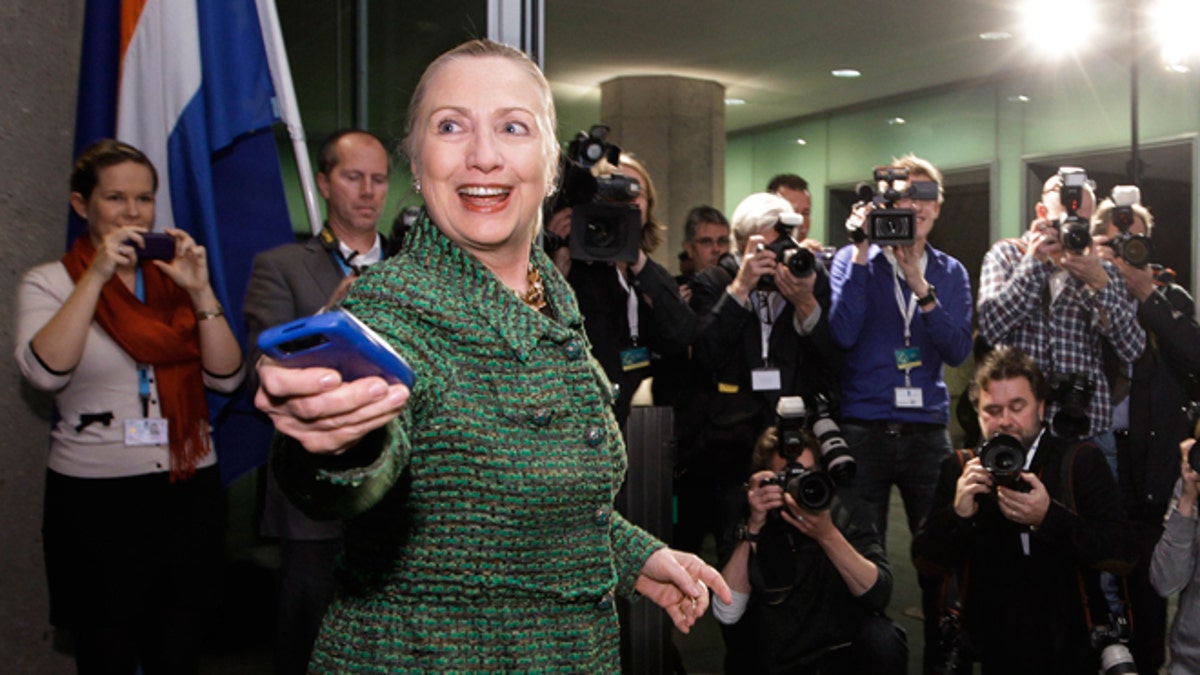
FILE - Dec. 8, 2011: Then-Secretary of State Hillary Rodham Clinton hands off her mobile phone after arriving to meet with Dutch Foreign Minister Uri Rosenthal at the Ministry of Foreign Affairs in The Hague, Netherlands. (AP Photo/J. Scott Applewhite, Pool/File)
The latest Obama administration scandal involving Hillary Clinton’s emails has many Americans discussing private email accounts used by government officials, and clarification is in order.
It’s appropriate and proper for a politician to use private email for personal and campaign business. This is what I did as governor of Alaska in order to be in compliance with the law, which requires that personal or campaign business not be conducted using public resources such as a government email account. There is a firm line separating the two.
The release of my emails was a great boon for Alaska’s tourism industry because dozens of national reporters descended on Alaska to pour through tens of thousands of pages of my emails looking for some smoking gun. They even crowd-sourced the work out to the general public to help them look for dirt! They were sorely disappointed.
However, that’s not what we see with this Clinton email scandal. As Secretary of State under Obama, Hillary Clinton used private email accounts on a privately maintained server 100 percent of the time for 100 percent government business. That’s unethical, no doubt illegal, and flies in the face of all claims of transparency. Hillary Clinton and her staff weren’t trying to be in compliance with the law; they were skirting it altogether.
The release of my emails was a great boon for Alaska’s tourism industry because dozens of national reporters descended on Alaska to pour through tens of thousands of pages of my emails looking for some smoking gun. They even crowd-sourced the work out to the general public to help them look for dirt! They were sorely disappointed.
Consider, for example, how Secretary Clinton’s private email server makes a mockery of transparency when it comes to Freedom of Information Act (FOIA) requests.
First, some background: I know something about how annoying FOIA requests can be for public officials. After I returned home from the 2008 vice presidential campaign, the state of Alaska was flooded with innumerable FOIA requests to see literally every single email I ever wrote while governor. It was an overwhelming request for a small population state with limited resources. But our system of government relies on transparency, and that means public officials must suck it up and let the public see whatever they want.
When FOIA requests bombarded us, investigators and our attorney general’s office were given full access to all of my state and private emails. The only emails redacted were the very few that were protected by attorney/client privilege – a determination agreed upon by my lawyers and the Attorney General’s office who reviewed them. In other words, an independent third party reviewed every email. There was no chance for any “smoking gun” to escape detection because nothing was kept secret in any way. Everything was done in the most transparent way possible.
Contrast that with the way Secretary Clinton has handled transparency. She created private email accounts for herself and her staff on a private email server that she controls completely.
She hasn’t handed over the server to any independent party for review, and it’s already too late to do so because for all we know someone might have already deleted any trace of incriminating emails to and from Secretary Clinton and her aides. This is the opposite of open and transparent government and obviously doesn’t follow the rules.
An honest politician has nothing to fear from the public seeing her emails. I know this. Eventually all but those few redacted emails of mine were released to the public and remain online to this day for anyone to read at any time.
In fact, the release of my emails was a great boon for Alaska’s tourism industry because dozens of national reporters descended on Alaska to pour through tens of thousands of pages of my emails looking for some smoking gun. They even crowd-sourced the work out to the general public to help them look for dirt! They were sorely disappointed.
All they found was evidence of an administration doing what the people sent us to do – work hard for them. My favorite summary of the email findings came from CNN’s Drew Griffin who reported: “I think what we’re seeing here is a hard-working governor, working hard for the state of Alaska, a lot of discussion about policy, about taxes, about cutting budgets, a lot of just mundane state government work.”
So, at least the media and the public learned a lot about conservative governance, responsible resource development, fiscal budgeting, Fish & Game management, and other scintillating topics.
But don’t take my word for it. Search the online databases of my emails created by the New York Times, Washington Post, Wall Street Journal, and other national media sources... and be bored.
Now many of these same media outfits are pursuing access to Secretary Clinton’s emails. Will they put the same effort into her emails as they did mine?
Unfortunately for America, we have no way of knowing what’s already missing from among Secretary Clinton’s emails. In fact, Rep. Trey Gowdy (R-S.C.), chair of the House select committee investigating Benghazi, explained that the emails she submitted to his committee contain huge gaps spanning months.
Good luck finding those missing emails. And good luck getting a straight answer from the Obama administration as to why no one in the White House noticed that the Secretary of State wasn’t using a government email account.
You’d expect more from the self-described “most transparent administration in history.” And you should demand more from anyone who wants to be president someday.




















